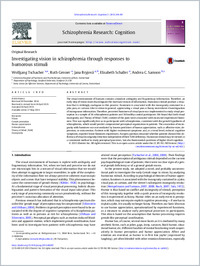Investigating vision in schizophrenia through responses to humorous stimuli
IPC
- Tschacher, Wolfgang ORCID University Hospital of Psychiatry and Psychotherapy, University of Bern, Switzerland
- Genner, Ruth University Hospital of Psychiatry and Psychotherapy, University of Bern, Switzerland
- Bryjová, Jana University Hospital of Psychiatry and Psychotherapy, University of Bern, Switzerland. Department of Psychology, Stanford University, Stanford CA, USA
- Schaller, Elisabeth University Hospital of Psychiatry and Psychotherapy, University of Bern, Switzerland
- Samson, Andrea C. Department of Psychology, Stanford University, Stanford CA, USA. Swiss Center for Affective Sciences, Department of Psychology, University of Geneva, Switzerland
- 27.05.2015
Published in:
- Schizophrenia Research: Cognition. - Elsevier BV. - 2015, vol. 2, no. 2, p. 84-88
English
The visual environment of humans contains abundant ambiguity and fragmentary information. Therefore, an
early step of vision must disambiguate the incessant stream of information. Humorous stimuli produce a situation that is strikingly analogous to this process: Funniness is associated with the incongruity contained in a joke, pun, or cartoon. Like in vision in general, appreciating a visual pun as funny necessitates disambiguation of incongruous information. Therefore, perceived funniness of visual punswas implemented to study visual perception in a sample of 36 schizophrenia patients and 56 healthy control participants.We found that both visual incongruity and Theory of Mind (ToM) content of the puns were associated with increased experienced funniness. This was significantly less so in participants with schizophrenia, consistent with the gestalt hypothesis of schizophrenia, which would predict compromised perceptual organization in patients. The association of incongruity with funniness was not mediated by known predictors of humor appreciation, such as affective state, depression, or extraversion. Patients with higher excitement symptoms and, at a trend level, reduced cognitive symptoms, reported lower funniness experiences. An open question remainedwhether patients showed this deficiency of visual incongruity detection independent of their ToMdeficiency. Humorous stimulimay be viewed as a convenient method to study perceptual processes, but also fundamental questions of higher-level cognition.
early step of vision must disambiguate the incessant stream of information. Humorous stimuli produce a situation that is strikingly analogous to this process: Funniness is associated with the incongruity contained in a joke, pun, or cartoon. Like in vision in general, appreciating a visual pun as funny necessitates disambiguation of incongruous information. Therefore, perceived funniness of visual punswas implemented to study visual perception in a sample of 36 schizophrenia patients and 56 healthy control participants.We found that both visual incongruity and Theory of Mind (ToM) content of the puns were associated with increased experienced funniness. This was significantly less so in participants with schizophrenia, consistent with the gestalt hypothesis of schizophrenia, which would predict compromised perceptual organization in patients. The association of incongruity with funniness was not mediated by known predictors of humor appreciation, such as affective state, depression, or extraversion. Patients with higher excitement symptoms and, at a trend level, reduced cognitive symptoms, reported lower funniness experiences. An open question remainedwhether patients showed this deficiency of visual incongruity detection independent of their ToMdeficiency. Humorous stimulimay be viewed as a convenient method to study perceptual processes, but also fundamental questions of higher-level cognition.
- Faculty
- Faculté des lettres et des sciences humaines
- Department
- Département de Pédagogie spécialisée
- Language
-
- English
- License
- CC BY-NC-ND
- Open access status
- gold
- Identifiers
-
- DOI 10.1016/j.scog.2015.04.007
- ISSN 2215-0013
- Persistent URL
- https://folia.unifr.ch/unifr/documents/325763
Statistics
Document views: 47
File downloads:
- tschacheretal.2015.investigatingvisioninschizophreniathroughresponsestohumorousstimuli_1-s2.0-s2215001315000177-main.pdf: 75
